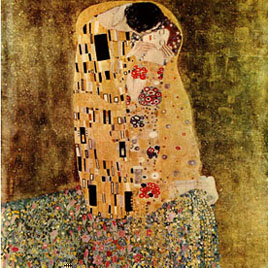|
 |
 |
| Gustav Klimt, The Kiss, 1908 or 1911 Osterreichische Galerie, Vienna |
 |
|
 |
|
| Cultural Studies: Introduction
What is Culture? What is Cultural Studies?
|
|
What is Culture? 'Cultural processes'? 'Circuit of Culture'?
*discussion: What is culture for you? Is MacDonald's part of Taiwanese culture?
|
What is Cultural Studies?
- an approach, in literary study as well as other areas in the Humanities, with some basic assumptions
- an academic discipline--its history
|
|
What is Culture? (from Representation Hall, 1997, p. 3)
1. traditional ones:
"the best that has been thought and said" in a society. It is the sum of the great ideas, as represented in the classic works of literature, painting, music and philosophy-the 'high culture' of the age.
2. the widely distributed forms of popular music, publishing, art, design and literature, or the activities of leisure time and entertainment, which make up the everyday lives of the majority of 'ordinary people'-what is called the 'mass culture' or the 'popular culture' of an age.
3. whatever is distinctive about the 'way of life' of a people, community, nation or social group. --shared values/meanings of a group or of society.
"Culture ...is not so much a set of things ...as a process, a set of practices. Primarily, culture is concerned with the production and the exchange of meanings-'the giving and taking of meaning'-between the members of a society or group."
- Value-feelings, attachments and emotions
"Culture is involved in all those practices...which carry meaning and value for us, which need to be meaningfully interpreted by others, or which depend on meaning for their effective operation. Culture, in this sense, permeates all of society"
TOP
|
Circuit of Culture--the five interacting loci of cultural practices
Representation, Regulation, Identity, Production*, Consumption:
(definitions from Media and Identities series. London: Sage, 1997.)
| Representation: |
'the production and circulation of meaning through language';
"language" as system of representation, as a signifying practice (semiotic approach), and as discourse
|
| Regulation: |
government policies and regulations;
the reproduction of a particular pattern and order of signifying practices (so that things appear to be 'regular' or 'natural');
cultural policy as well as cultural politics, involving struggles over meanings, values, forms of subjectivity and identity.
a dynamic process that is often contested'
|
| Identity: |
derive from a multiplicity of sources--from nationality, ethnicity, social class, community, gender, sexuality--sources which may conflict in the construction of identity positions and lead to contradictory fragmented identities.
identity gives us a location in the world and presents the link between us and the society in which we live.
|
| Production*: |
"cultural economy" economic processes and practices as cultural phenomena, as depending on meaning for their effective operation
|
| Consumption: |
an active process and often celebrated as pleasure,
In postmodern accounts, cultural consumption is seen as being the very material out of which we construct our identities: we become what we consume.
|
*another way of defining "production" is to see the production of meaning at different cultural moments: "material production, symbolic production, textual production, and the 'production in use' of consumption" (J. Storey 2).
TOP
|
|
Basic assumptions of cultural studies:
- de-centering, interdisciplinary ; contextualizing--no longer the great divide between high art and popular culture; place the text in the context of 'the circuit of culture," of society, nation as well as multinational capitalism and global cultural exchanges (migration).
- materialist/Marxist
"Marxism informs cultural studies in two fundamental ways.
1. to understand the meanings of culture we must analyze it in relation to the social structure and its historical contingency
2. cultural studies assumes that capitalist industrial societies are societies divided unequally along ethnic, gender, generational and class lines. ...culture is one of the principal sites where this division is established and contested: culture is a terrain on which takes place a continual struggle over meaning, in which subordinate groups attempt to resist the imposition on meanings which bear the interests of dominant groups. It is this which makes culture ideological." (Storey p. 3)
TOP
|
|
|
|
|
